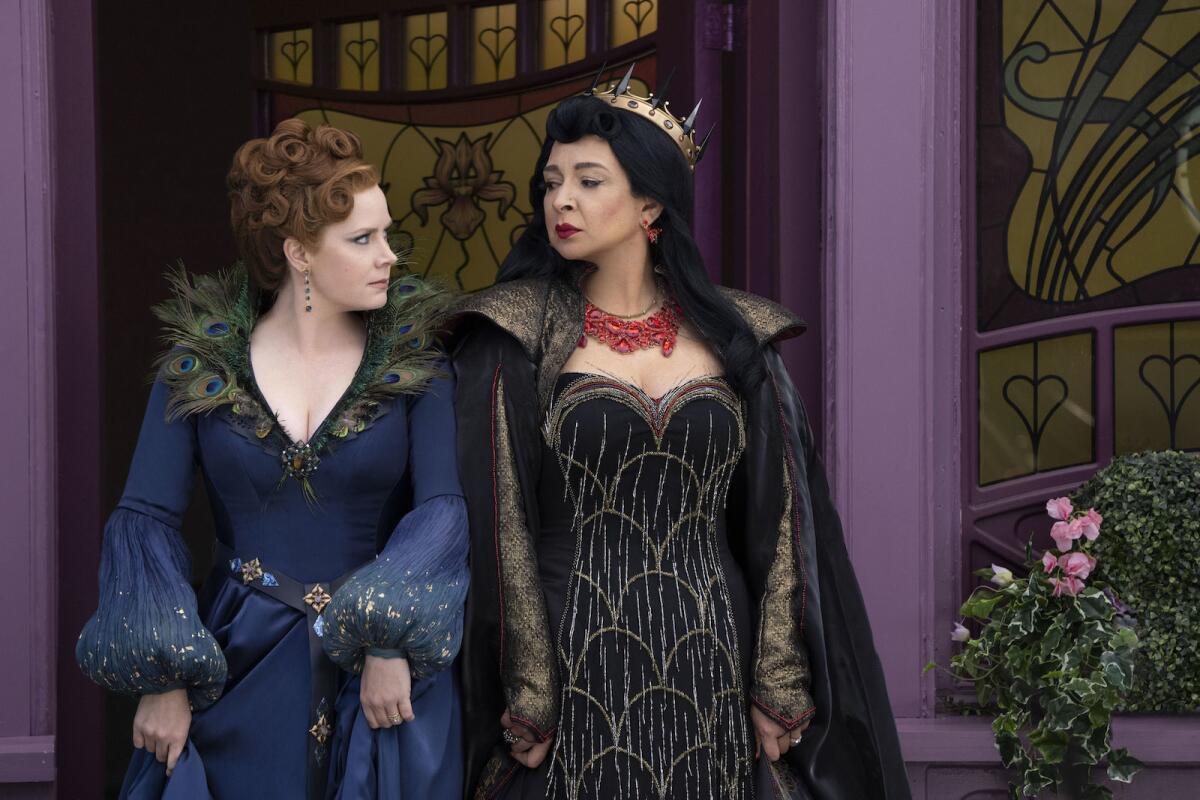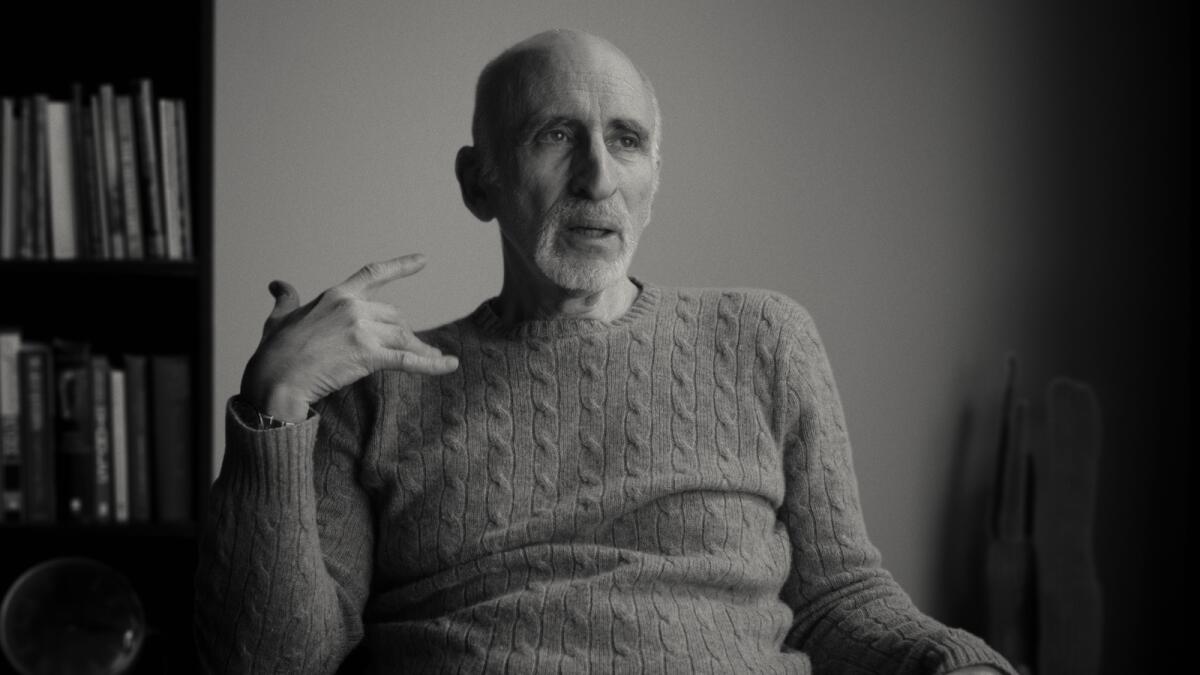Less enchanting than its predecessor, ‘Disenchanted’ gets by on the charm of Amy Adams

- Share via
‘Disenchanted’
Before “Tangled” and “Frozen” reinvented the Disney fairy tale for the 21st century, the studio released 2007’s “Enchanted,” a puckish live-action romantic comedy starring Amy Adams as Giselle, who tumbles from a magical animated world into a modern New York City. In that film — a critically acclaimed, Oscar-nominated hit — the heroine’s bubbly optimism beat back both magical and mundane evils, and won her true love in the form of a divorced dad named Robert (Patrick Dempsey). But as always with sly fairy tale subversions, “happily ever after” wasn’t quite the end.
The long-delayed sequel “Disenchanted” is set 15 years later, and finds Giselle experiencing the kind of midlife crisis common to our real world. She’s worried about her cynical teenage stepdaughter Morgan (Gabriella Baldacchino), so she moves the family to the quaint suburban village of Monroeville, lorded over by the bossy Malvina (Maya Rudolph). Giselle’s wish to make her life more like a fairy tale backfires though, when she finds herself transforming into a wicked stepmother.
“Disenchanted” lacks its predecessor’s charming ease. The plot is overcomplicated, relying too much on detailed explanations of how spells work; and the premise offers an ungainly mix of relatable disappointments and outsized dilemmas, frequently involving cartoonish villainy.
But none of that matters, really. The sequel is still pretty winning. The songs by Alan Menken and Stephen Schwartz are even better than the numbers in “Enchanted,” with great vocal performances by Idina Menzel (as Giselle’s princess pal), Baldacchino, Rudolph and Adams. And Adams is still an absolute dynamo as Giselle, fluctuating between preternatural cheeriness and storybook meanness. As in the first film, the actress strikes a graceful balance between the silly and the sincere, embodying and even humanizing everything people love about fairy tales.
“Disenchanted.” PG, for mild peril and language. 1 hour, 58 minutes. Available on Disney+
—

‘Stutz’
Actor-director Jonah Hill seeks to demystify psychotherapy by taking people inside his own sessions in “Stutz,” a simple but emotionally affecting documentary that takes the form of several conversations between Hill and his therapist Phil Stutz. Shot in a soft, lovely black-and-white, the film is both the story of one beloved doctor’s life — from how he developed his methods early in his career to how he copes with Parkinson’s now — and a candid look at Hill’s self-doubts as a person and an artist.
The primary idea Hill wants to share is Stutz’s concept of “tools,” which is his term for the actionable steps people can take to feel better about themselves. Stutz is a fervent believer that people in a mental health crisis need immediate relief, and that his patients eventually should start accepting their struggles as a part of who they are. Hill talks through his own favorite tools with his doctor, and describes how he’s applied them to his own life.
“Stutz” is often heavy and unsettlingly honest; and its therapy-speak is thick, in ways that may be hard for people who’ve never had that experience to penetrate. But the two men also crack jokes together, and they express a genuine affection for each other that is heartwarming. This film has a worthy goal: to change the perspectives of people who might be hurting right now. For those willing to go with its flow, it has a real power.
“Stutz.” R, for some language. 1 hour, 36 minutes. Available on Netflix
—

‘Love, Charlie: The Rise and Fall of Chef Charlie Trotter’
The innovative and divisive Chicago chef Charlie Trotter died in 2013 at age 54, which may have been both the best and worst thing for his legacy. On the one hand, he didn’t live long enough to become one of those venerated culinary giants who pops up regularly today on “Top Chef” and the Food Network. On the other hand, Trotter was notorious for screaming at and overworking his cooks and servers, in ways that run counter to the current belief that genius is no excuse for abusiveness.
Rebecca Halpern’s energetic, in-depth documentary “Love, Charlie: The Rise and Fall of Chef Charlie Trotter” covers the highs and lows of the man’s career — including the lawsuits he settled with disgruntled employees and the financial hits he took when the economy tanked. The movie comes across as a kind of mystery, with no clear solution. It’s hard to explain how Trotter became so brilliant, except that he was uncannily driven to do so; and it’s hard to explain why he was such a terror in the kitchen, except that it was not uncommon back then for chefs to be tyrants. What makes this film so fascinating is that its subject remains an enigma: a pioneer who did a lot of good and inspired a lot of people, then faded quietly away, leaving questions about who he really was.
“Love, Charlie: The Rise and Fall of Chef Charlie Trotter.” Not rated. 1 hour, 36 minutes. Available on VOD; also playing theatrically, Laemmle Monica, Santa Monica
‘In Her Hands’
Before the U.S. pulled out of Afghanistan and the Taliban regained control of the government, the country had begun making moves toward liberalization — as evidenced by the election of one of its first female mayors, then 26-year-old Zarifa Ghafari. The documentary “In Her Hands” follows a harrowing two years in Ghafari’s administration, as abroad she became a symbol of progress while at home she and her family faced threats and challenges from fundamentalists who vehemently believe a woman’s place is in the home.
Co-directors Tamana Ayazi and Marcel Mettelsiefen take a “you are there” approach to Ghafari’s story, plunging viewers into the mounting chaos as the end of the American occupation approaches. This choice robs the film of some context. We don’t learn much about how the government or politics work in Afghanistan; and there’s very little in the way of historical background. But by giving a voice both to Ghafari and — in a few scattered scenes — her fierce opposition, “In Her Hands” does capture with direct immediacy how hard it can be to loosen up a culture with a tradition of rigidity.
“In Her Hands.” PG-13, for violent content, brief strong language and brief drug use. 1 hour, 32 minutes. Available on Netflix
‘Master of Light’
Documentarian Rosa Ruth Boesten works with a remarkable subject for her film “Master of Light,” an intimate look at George Anthony Morton, a world-renowned painter who grew up in a neighborhood filled with criminals and drug-dealers. After spending most of his 20s in prison, Morton came out having honed his artistic skills enough to get accepted into a top European academy. For the film, Morton lets Boesten into the stark contrasts of his life, which sometimes sees him traveling the world, sharing work that aims to apply the techniques of the classical masters to Black lives, and sometimes sees him dealing with the criminal justice bureaucracy to get his family members out of jail. The lingering trauma of Morton’s upbringing is an ongoing challenge for him, even with all of his success; and this quietly moving movie examines how the right opportunities or the wrong expectations can make all the difference in who a person becomes.
“Master of Light.” TV-14, for adult content and language. 1 hour, 24 minutes. Available on HBO Max
‘Taurus’
The actor and musician Colson Baker — a.k.a. Machine Gun Kelly — plays a depressed, drug-addicted pop star named Cole in writer-director Tim Sutton’s arty indie drama “Taurus,” which blurs the lines between expressionism and docu-realism in its portrait of the pressures of fame. Set across the course of several doomy days in Cole’s life, the film sticks uncomfortably close to him as he stumbles through a swirl of personal drama, promotional appearances, fan adulation and decadent indulgence, interrupted by the occasional jolt of actual creativity. The movie’s insights into celebrity don’t penetrate far below the surface and they sometimes seem to skew dark for darkness’ sake. But Sutton and his cast do craft some sequences that really hum, particularly in the combative give-and-take between Cole and his long-suffering assistant Ilana (Maddie Hasson). At its best, “Taurus” captures the tumult of the artistic process, where happy accidents and unpleasant truths are perpetually in conflict.
“Taurus.” Not rated. 1 hour, 37 minutes. Available on VOD
Also on VOD
“Missing” is a subtle and chilling Japanese crime drama, about a teenager named Kaeda (Aoi Ito) who goes looking for her depressed, debt-ridden widowed father (Jiro Sato), after he disappears while trying to collect the reward for identifying a serial killer. Director Shinzo Katayama and screenwriters Ryo Takada and Kazuhisa Kodera take the audience on a journey with Kaeda, pausing occasionally for flashbacks and explanations that complicate the nature of the case, raising questions about what constitutes “murder” in a world where many people have checked out of their own lives. Available on VOD
Available now on DVD and Blu-ray
“The Infernal Affairs Trilogy” collects a trio of influential Hong Kong action films originally released in 2002 and 2003 — and then remade in part as the Oscar-winner “The Departed” in 2006. What starts as the story of a cop (masquerading as a gangster) matching wits with a gangster (masquerading as a cop) opens up into a sprawling, generation-spanning saga, tracking the many ways that the police and their triad counterparts have become crumbling institutions, more reliant on each other than either would care to admit. Criterion
More to Read
Only good movies
Get the Indie Focus newsletter, Mark Olsen's weekly guide to the world of cinema.
You may occasionally receive promotional content from the Los Angeles Times.









